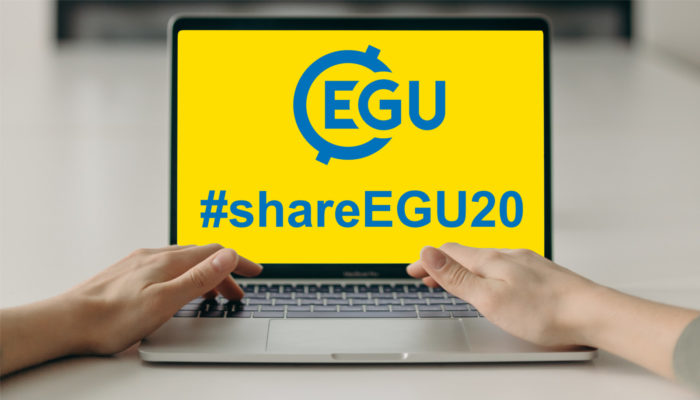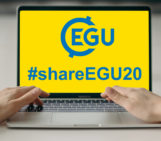
The EGU Tectonics and Structural Geology (TS) Early Career Scientist (ECS) team usually write a blog post soon before the yearly EGU General Assembly. This blog post normally helps to highlight a few of the activities that will happen in the General Assembly. As the ECS TS Representative, and in this exceptional year in which the meeting will be virtual, I take this opportunity to provide (i) general advice to EGU TS attendees, members, conveners and authors, as recently informed by the EGU Programme Committee Chair, Susanne Buiter, and (ii) an update on EGU TS ECS team activities that take place between gatherings in Vienna.
Your active participation
Sharing Geoscience Online (#shareEGU20) will take place May 4th to 8th. Sharing Geoscience Online is a new concept, and all participants (EGU organizers, conveners, authors and attendees) have to collaborate to make it a success. Your active participation and commitment is key and will lead to a virtual meeting in which to discuss and share our science! A myriad of activities are offered at #shareEGU20. Activities include the Union Symposia, Great Debates, Short Courses, All Division Meetings, All Union-wide and Division Networking Activities, Photo Competition…. And of course, the Sessions and contributions! During the #shareEGU20, the EGU Division for Tectonics and Structural Geology (TS) will have an assembly meeting live chat on Wed, 06 May, 12:45 – 13:45. Important information about the TS Division will be shared and discussed.
If you are a TS contact author you must have received an email from the TS Division asking your opinion on whether a name change of the TS medal could be considered. Please, take a moment to send your feedback by replying to this email.
Advice to Authors
Authors do not have to pay a registration fee to participate and enjoy all the activities that Sharing Geoscience Online brings to the General Assembly this year. The new online format allows active scientific exchange (https://egu2020.eu/sharing_geoscience_online.html) and authors are encouraged to discuss the scientific material that is already online and upload their presentation materials, now called Displays. You can already upload up to 50 MB in your format of choice (poster, presentation with one/multiple slides, video, all either with or without audio) to the EGU website. Your Display and abstract will be bundled before the assignment of a Digital Object Identifier (DOI) and distribution under a Creative Commons Attribution 4.0 License (CC BY 4.0). The setup will allow you to share the content of your research that you are comfortable sharing. Then, it can be used and shared by providing a citation, an indication of changes and the link to the original license. Feedback and/or comments will be possible from the moment of upload until May 31st and the materials will remain openly accessible afterward. You may want to check some EGU blogs about preparing your presentation materials and your participation in the chat:
- Uploading your materials, a webinar and walkthrough
- Presentation material format and copyright questions
- #shareEGU20 planning your week of digital interaction
Please, contact us if you have any questions!
Advice to conveners
Session conveners and co-conveners at Sharing Geoscience Online can log into www.egu2020.eu as a convener and navigate to their session. You can enter the ‘session modification’ to add extra information on the session live chat, moderation and/or structure. This information will be seen next to your session description in the programme page. You can also set session chair persons to moderate the live chat, assuring that at least 2 persons, whether conveners or other colleagues, are available for such moderation at all time. Please, also upload session information or materials (in a cross-platform file <50 Mb) to provide background or highlights of your session, and get in contact with the authors directly to explain these or other matters. Please visit the Sharing Geoscience Online page regularly, to find detailed, up-to-date, as it becomes available.
Although Displays have been scheduled in blocks of ~30 mins for each chat, conveners should choose how to structure the live chat depending on their session and its size to secure visibility of each contribution. A possible way may be to ask authors to provide a couple of sentences summarising their main result/highlight/discussion topic. You could structure your chat by topic, formulating guiding questions from the abstracts and uploaded display materials. Participants should also have time for open discussion. Find more tips on the EGU blog post #shareEGU20: Top 10 tips for promoting good online engagement for conveners
Activities and Updated in the EGU TS ECS team
As the EGU Tectonics and Structural Geology (TS) Early Career Scientist (ECS) Representative, I’d like to first acknowledge the valuable work of the ECS in the TS team, and then provide an update on activities that the team has worked, is working or will work on. The EGU TS ECS team runs thanks to the voluntary effort of a small group of researchers, as happens for the rest of the EGU. In our case, we are in the early stages of our academic early career. We create and engage in activities that we like to think add value to for the TS community as a whole, and to ECS in particular. The ECS TS team is always looking for new members and ideas for activities to do and/or about regular series on our social media are always welcome, so get in contact!
A new structure for the EGU ECS team
The EGU ECS TS team has now a more compact structure, with three sub-teams that are coordinated by the TS Representative, and internally led by sub-team leaders.
TS Blog Team – Elenora van Rijsingen to Hannah Davies. Perhaps the most active sub-team between assemblies is the TS Blog Team. The quality and popularity of the blog speak wonders of the excellent lead editorial work by Elenora van Rijsingen. Elenora has been the “editor-in-chief” and leader of the TS Blog Team for more than 4 years now, and her continued dedication to the blog has resulted in numerous blog posts and excellent editorial advice for the rest of us. Elenora is in the process of stepping out of the role to lay the way for Hannah Davies. It’s already clear that the duty is not too big for Hannah, who has already created the new blog series Beyond Tectonics. I’d also like to explicitly mention the efforts of TS Blog Team members: Anne Pluymakers for her contribution to various series’ on the blog, including but not limited to Minds over Methods and Mind your head, Derya Gurer for her contribution to the Minds over Methods series, among other contributions, Samuele Papeschi for his regular contributions to the Features from the field series, and myself, for regular interviews on the Meeting plate tectonics series.
TS Media Team – Michael Kettermann to a new Media-Officer. This team disseminates information relevant to the TS community, as well as about the EGU and ECS TS team and its blog, on different social media outlets. Michael Kettermann has served as ‘News and Media Officer’ of the TS team for more than 3 years, and we highly appreciate his contribution. Michael has played an integral role as our social media ambassador, and is now handing over his responsibilities. The TS Division President, Claudio Rosenberg, and I are looking for a Media-Officer-In-Chief that is eager to re-energize the TS Media Team and coordinate communication across various platforms. I’d like to also thank Roland Neofitu for the “Jobs on Friday” Facebook posts that are now published on twitter as well, and led by Gino de Gelder. Sudheer Kumar Tiwari continues to push the Facebook Monday post on new papers published by TS ECS researchers.
TS Activities Team – David Fernández-Blanco. The TS Activity Team coordinates activities outside those mentioned above. An example is a Tectonics and Structural Geology field-class, commonly prior to the General Assembly. This fieldwork will not take place this year, and instead, I want to highlight an upcoming activity named “TS Must-read papers”. The activity could be roughly described as a community-wide forum for discussion of a “TS Must-read paper” in tectonics and structural geology. “Must-read papers” will be selected soon by the tectonics and structural community via open vote. The TS Activity Team thinks that this community-engagement activity can be an exciting opportunity to cheer up the Tectonics and Structural Geology community in these infamously historical times.
Together with Gianluca Frasca, I have gathered 12 young researchers with different backgrounds that will be part of 3-persons teams. We are, in alphabetical order: Adriana Guatame-García, Armin Dielforder, Benoît Petri, David Fernández-Blanco, Folarin Kolawole, Gianluca Frasca, Gino de Gelder, Marta Marchegiano, Pan Luo, Patricia Cadenas, Silvia Crosetto, and Utsav Mannu. Every 2 weeks, a team will be in charge of promotion of a “Must-Read paper” and the moderation of the discussion of the selected papers by the TS community. Information derived from the discussion will serve as a base to write a blog post about each paper on the TS Blog page. The blog post will provide a short synopsis, and highlight key points, controversies and opening venues/fields of the paper, and will also mention relevant contributors to the discussion of that paper. The action will be launched as soon as its final details are defined, and possibly after #shareEGU20, so stay tuned!
Useful links
– Presentation by EGU President (Alberto Montanari) and Programme Committee Chair (Susanne Buiter)
– FAQ


